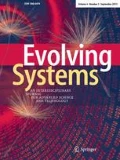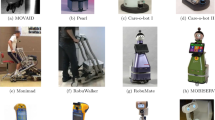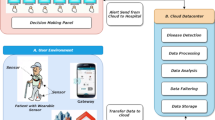Abstract
Driven by the heterogeneity of pervasive environments, a user task can be defined independently of devices’ resources as an assembly of abstract components, requiring services from and providing services to each other. To achieve the task’s execution, it has to be resolved in concrete components, which involves automatic matching and selection of components across various devices. Moreover, user tasks in pervasive environments are challenged by the dynamism of their execution environments. Thus, there is a need to adapt them for a continuous execution. Towards these challenges, we propose in this article a middleware that allows for each service of a user task, the best selection of the device and component used for its execution. The task resolution approach considers in addition to the functional aspects of the task, the user preferences, devices capabilities, services requirements and components preferences. The middleware also carries out adaptation of user’s tasks to cope with the dynamicity of pervasive environments. The adaptation consists of a partial reselection of devices and components that are affected by the changes. For this purpose, the middleware uses monitoring mechanisms to detect the changes during the execution of the user tasks.





Similar content being viewed by others
References
Abowd GD, Dey AK, Brown PJ, Davies N, Smith M, Steggles P (1999) Towards a better understanding of context and context-awareness. In: The 1st international symposium on handheld and ubiquitous computing, HUC’ 99, Karlsruhe, Germany, pp 304–307
Becker C, Handte M, Schiele G, Rothermel K (2004) PCOM—a component system for pervasive computing. In: The second conference on pervasive computing and communications, PerCom 2004, Orlando, FL, USA, pp 67–76
Belaïd D, Ben Lahmar I, Mukhtar H (2010) A framework for monitoring and reconfiguration of components using dynamic transformation. Int J Adv Softw 3(3&4):371–384
Ben Lahmar I, Belaïd D, Mukhtar H, Chaudhary S (2011) Automatic task resolution and adaptation in pervasive environments. In: The second international conference on adaptive and intelligent systems, ICAIS’ 11, Klagenfurt, Austria, pp 131–144
Ben Mokhtar S, Georgantas N, Issarny V (2007) Cocoa: conversation-based service composition in pervasive computing environments with QOS support. J Syst Softw 80(12):1941–1955
Floch J, Hallsteinsen S, Stav E, Eliassen F, Lund K, Gjorven E (2006) Using architecture models for runtime adaptability. IEEE Softw J 23:62–70
Ibrahim N, Le Mouel F, Frenot S (2009) Mysim: a spontaneous service integration middleware for pervasive environments. In: The international conference on pervasive services, ICPS’ 09, London, UK, pp 1–10
Kalasapur S, Kumar M, Shirazi BA (2007) Dynamic service composition in pervasive computing. IEEE Trans Parallel Distrib Syst 18:907–918
Kiss C (2007) Composite capability/preference profiles (cc/pp): structure and vocabularies 2.0. w3c working draft 30 April 2007. http://www.w3.org/TR/2007/WD-CCPP-struct-vocab2-20070430/
McKinley PK, Sadjadi SM, Kasten EP, Cheng BHC (2004) Composing adaptive software. J IEEE Comput 37:56–64
Mukhtar H, Belaïd D, Bernard G (2008) A model for resource specification in mobile services. In: The 3rd international workshop on services integration in pervasive environments, SIPE ’08, Sorrento, Italy, pp 37–42
Mukhtar H, Belaïd D, Bernard G (2009) User preferences-based automatic device selection for multimedia user tasks in pervasive environments. In: The 5th international conference on networking and services, ICNS’ 09, Valencia, Spain, pp 43–48
Mukhtar H, Belaïd D, Bernard G (2011) Dynamic user task composition based on user preferences. ACM Trans Auton Adapt Syst 6(1):1–17
Open SOA Collaboration (2007a) SCA assembly model specification V1.00. http://www.osoa.org/
Open SOA Collaboration (2007b) SCA policy framework v1.00 specifications. http://www.osoa.org/
Platzer C, Rosenberg F, Dustdar S (2009) Web service clustering using multidimensional angles as proximity measures. ACM Trans Internet Technol 9(3):1–26
Román M, Campbell RH (2003) A middleware-based application framework for active space applications. In: International conference on middleware, Middleware ’03, Rio de Janeiro, Brazil, pp 433–454
Sousa JP, Garlan D (2002) Aura: an architectural framework for user mobility in ubiquitous computing environments. In: The 3rd working IEEE/IFIP conference on software architecture, Montreal, Canada, pp 29–43
Zhou ZB, Sellami M, Gaaloul W, Defude B (2011) Clustering and managing data providing services using machine learning technique. In: Proceeding of seventh international conference on semantics knowledge and grid, SKG’11, Beijing, China, pp 225–232
Author information
Authors and Affiliations
Corresponding author
Rights and permissions
About this article
Cite this article
Ben Lahmar, I., Belaïd, D. & Mukhtar, H. Middleware for task resolution and adaptation in pervasive environments. Evolving Systems 3, 221–233 (2012). https://doi.org/10.1007/s12530-012-9057-2
Received:
Accepted:
Published:
Issue Date:
DOI: https://doi.org/10.1007/s12530-012-9057-2




